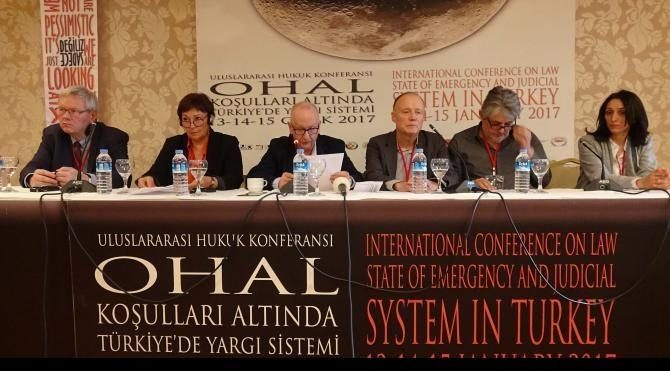Report by Hans Gaasbeek about the international lawyer conference held in Ankara (Turkey) between the 13th and 15thof January, 2017
The ‘International Conference On Law, State of Emergency And Judicial System in Turkey’ was co-organized by different European lawyer organizations like: the AED (European Democratic Lawyers), the ELDH (European Association of Lawyers for Democracy and World Human Rights) and the Foundation Day of the Endangered Lawyer.
The conference was also co-organized by the European organization of judges MEDEL (Magistrats Européens pour la Démocratie et les Libertés). A great number of bar associations of cities in all corners of Turkey was co-organizer and had a big impact on the programme and organization of the conference.
The conference was held in Hotel Plaza in Ankara, where a lot of international colleagues were staying for the weekend.
This was a pleasant hotel with a very well-equipped conference room. There was no special security, except for one unarmed person at the entrance of the hotel. There was a huge interest from Turkish lawyers in the conference. They were coming from over 30 Turkish cities. There were 300/400 lawyers and judges taking part. 6 panels were organized with different speakers, who highlighted their specific subject. The subject of the speeches was the actual situation of the disappearing state of law in Turkey.
It was very different from other lawyer conferences. In this conference there was a lot of attention for the other professionals who are also endangered. There was a journalist panel, a judges panel, a panel of members of parliament. The panels of the journalists, judges and members of parliament and also the international panel and the Turkish lawyer panels have painted a very accurate picture of the actual situation and how the different professions are threatened and have to work in an atmosphere of fear and intimidation.
In the international panel I informed the public about the way the Dutch social lawyers association VSAN works and about the way of working of the Foundation Day of the Endangered Lawyer. I also invited the lawyers of the 30 Turkish cities to manifest themselves on the Day of the Endangered Lawyer for the general position of the lawyers and the attacks on the Rule of Law. I explained how the actual difficult situation in Turkey is seen by the politicians and press in Holland. During the congress I was in contact with a journalist of the Dutch newspaper Algemeen Dagblad a couple of times; he published a small interview with me on the internet (a copy of this interview is attached to this report). I was the only person from the Netherlands present on this international conference.
Because of the fear for tensions and possible problems for the organizors of the conference, I had informed and invited the Dutch embassy to take part in the conference. After a few contacts via e-mail we were able to establish a good working relationship with the second secretary of the embassy, who was present during the afternoon programme on the second day of the conference. I introduced him to a lot of judges and lawyers who represented the different Turkish bar associations and the international organizations. He was the only diplomatic visitor, which gave the conference an extra dimension, also from the point of view of safety.
The former German judge Ingrid Heinlein was also present at the conference. We had already been in touch with her in 2016, when the Day of the Endangered Lawyer focused on the difficult situation of the lawyers and judges in Honduras. This judge had taken part in a fact-finding human rights mission in Honduras two years ago. She has already been a member of the international European judges organization MEDEL for more than 20 years, and is also a member of the German ‘judges for judges’-association. I also contacted the Dutch foundation Rechters voor Rechters (Judges for Judges) about the Ankara conference. The president of this foundation had also thought about taking part in this conference.
During the conference, there were no real problems with the Turkish police or justice authorities, apart from one incident: the Italian lawyer Barbara Spinelli – who was going to speak at the conference – was stopped at the airport in Istanbul. They arrested her and made her spend one night imprisoned, before sending her back to Italy the next day. She was hindered in taking part in the conference, while she was one of the speakers of the international panel.
During the conference a lot of information was given to the lawyers and judges present. After the failed coup attempt 70.000/80.000 people were put in prison. Among them were 3007 judges and prosecutors and about 300 lawyers.
Detaining so many judges and lawyers is a very, very intimidating action for these professions and, in my view, it means the abrupt end of the Rule of Law in Turkey. We cannot possibly speak of an independent judicial system anymore, in which no political or other state power influences decisions. At the moment the government exercises extreme power over the judiciary. This is an unacceptable situation for a democracy.
Those present in the conference were told that many radio stations and television stations and newspapers were closed by the government. The speakers in the panels were under the impression that after the coup, many people were arrested arbitrarily and for not very logical reasons. Judges, lawyers and prosecutors were arrested randomly. Furthermore, at the conference it was said that the Turkish government didn’t do any serious investigation on the real perpetrators after the coup. It was even said that the investigation had already been closed or would close very soon.
At one lawyers office 7 lawyers were arrested. One of the people still representing this office gave me a small file with a request for help. The last remaining lawyer at this office – who had not yet been arrested – had to offer legal assistance to his own colleagues.
After being arrested, judges and lawyers are being kept in detention, according to their Turkish colleagues, in opposition to the rules of the European Convention on Human Rights and against the standards of the Turkish detention laws. Arrested lawyers and judges are not allowed to see a lawyer, and if they are, it is – in the best case – only half an hour per week. All contacts with their lawyer and with third parties are being recorded and monitored by police officers in prison. Official papers are being copied by the prison authorities. Besides that, lawyers are directly identified with their clients who are often accused of being part of the Gülen movement.
I was impressed by the very strong solidarity between all the lawyers coming from more than 30 Turkish cities from all over the country. The Turkish lawyers were very happy to have the support of the co-organizing European lawyer organizations and the organizations of judges. All the international guests were treated with big hospitality and personal support.
Among the many arrested lawyers and judges there are also many presidents from local bar associations and even from courts. The Turkish media who are pro-Erdogan and who are pro-the Turkish government are often accusing the arrested jurists of being terrorists, which makes it easier for the government to treat the arrested more severely and facilitates even more restrictions during their detention.
Since July 2016, the Turkish government has lifted c.q. suspended the working of the ECHR, by declaring a state of emergency and prolonging this afterwards. In Turkey groups and individual persons are often being accused of being a member of a criminal organization. Furthermore there have been many house and office searches in the homes and working places of arrested lawyers and judges. There have been many complaints about the treatment of people in detention. Many detained lawyers and judges complain about the fact that they were harmed psychologically and physically because the lights in their cells were on the entire night, so they couldn’t sleep. The detained lawyers and judges are often humiliated; they complained of being exposed in handcuffs in court houses.
There seems to be a situation of growing lawlessness, which is not only increasing for the arrested judges and lawyers, but also for those who have not yet been arrested.
We have been informed that the prosecution of judges and lawyers in Turkey is done with many faults and in a very careless manner. Many people are accused, without any real evidence or proof. Also, most of the times the actual exact accusation is very unclear. Often, it appears that the accusations are quite bizarre like undermining the state, doing terrorist acts or being a member of a criminal organization. Especially since the Turkish government has forbidden many, many organizations, also two well-known lawyer organizations, OHD and CHD, people can now be arrested quickly and be seen as an offender when they are a member of such forbidden lawyer organizations or active in such organizations.
The Turkish colleagues took very good care of their foreign colleagues. We were picked up and brought back to the airport and treated with a lot of hospitality.
From my contacts with many Turkish colleagues at the conference, it appears to me that many people are exhausted because of the continuous pressing political situation. It was clear that the colleagues are suffering because of this actual political situation. In Ankara, there was a lot of police on the street and it was no longer a town with atmosphere.
At the diner in the building from the bar of Ankara, the situation was quite different. After a very nice dinner, we heard people singing Turkish songs and dancing. After saying goodbye to our colleagues we took the bus to the airport and left with mixed feelings. We were leaving while they had to continue living in this difficult situation.
Hans Gaasbeek
International coordinator of the Day of the Endangered Lawyer, president of the Foundation Day of the Endangered Lawyer and vice president of the Dutch League of Human Rights


